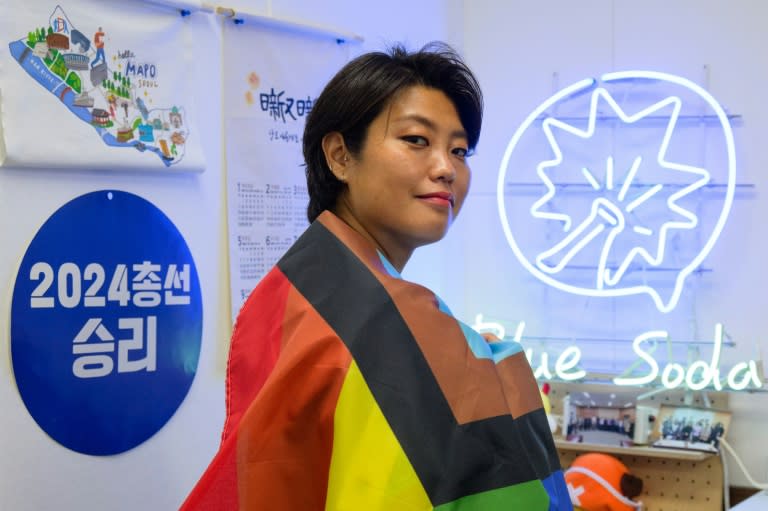'We exist': S. Korea's first LGBTQ councillor tackles inclusion

South Korea's first openly gay legislator may have cracked the ruling party's rainbow ceiling but admits there is a long way to go to make the country's politics inclusive.
In a milestone celebrated by the LGBTQ community, Cha Hae-young was elected to the Mapo district council on June 1, 2022 -- the same day as Seoul's annual LGBTQ Pride march.
Two years later, Asia's largest queer festival is once again being shunted away from the capital's central plaza after city officials said Saturday's planned celebrations could "provoke social conflicts".
The annual event attracts support from across the region, as well as strong opposition, especially from Christian groups.
Cha acknowledged many people in South Korea found it hard to discuss sexuality and LGBTQ matters, but said it was important that there was more public discussion of these issues in order to move forward.
Even within Cha's party, which holds the majority in parliament, "there is no strategy for how to discuss these opinions with the public."
"We need to show the people that we (LGBTQ people) exist," Cha, who uses they/them pronouns, told AFP.
Much of Cha's work has been about visibility -- a role they have adopted with personal gusto.
Their office, in an otherwise drab building in Seoul's Mapo district, is adorned with rainbow garlands and complete with a large Pride flag.
"The other council members were a bit surprised at first," Cha said.
"They are used to it now -- and to me."
Still, the burden of being the only out politician sometimes weighs on the 37-year-old former radio producer.
"For me, being gay is something to be proud of. But it also makes you vulnerable (as a politician)," said Cha, who has pushed for anti-discrimination and marriage equality legislation to be enacted.
- Pride backlash -
Seoul's queer festival will celebrate its 25th anniversary on Saturday.
But for the second year in a row, its organisers were denied permission to hold events at four locations in the capital -- including the central plaza for the main event.
City authorities have blamed scheduling clashes, and said the event could "provoke social conflicts".
But the festival's organisers have said this is not good enough.
"Equality means to have an event for sexual minorities in a public space -- to block it is inequality," said Yang Sun-woo, chair of the Seoul Queer Culture Festival.
"I would like to ask Seoul Mayor Oh Se-hoon if this is the 'global and leading city' he claims Seoul is," Yang added.
The city's conservative mayor Oh said last year he "personally can't agree with homosexuality" -- a stance that appears to clash with the Seoul's frequently stated goal of becoming an "open and inclusive city of mutual prosperity".
Clashes with police broke out at Pride event in the southern city of Daegu last June, after the city's mayor Hong Joon-pyo attempted to block the celebrations.
- Diversity calling -
But South Korea is facing a new reality: with one of the world's lowest birth rates, the ethnically homogenous society needs to welcome more immigrants -- and with them diversity.
Before that, "we need to show the people that we (LGBTQ people) exist," so they can see the diversity that exists in South Korean society already, Cha said.
Despite being South Korea's only openly LGBTQ elected official, Cha said they have found politics welcoming and productive.
A framed poster on their desk reads: "We welcome all races, all religions, all countries of origin, all sexual orientations, all genders. We stand with you, you are safe here".
Cha said they were hoping to make their party -- which holds a majority in parliament but does not control the presidency -- more open to all.
"As the majority party we need to move to an inclusive society, not an exclusionary one," said Cha, adding this will be the focus of their remaining two years in office.
"But a re-election is important because two years isn't enough time" to get all this done, they added.
hs/ceb/dhw/mtp

